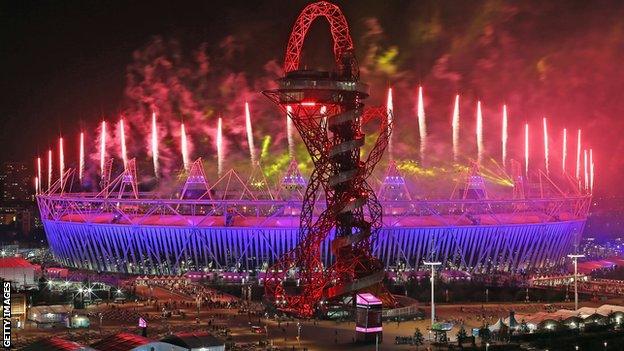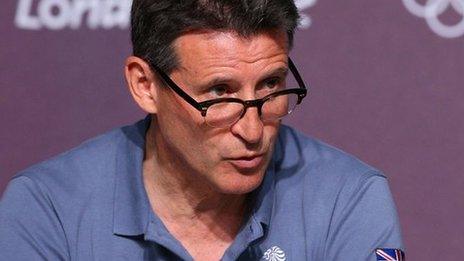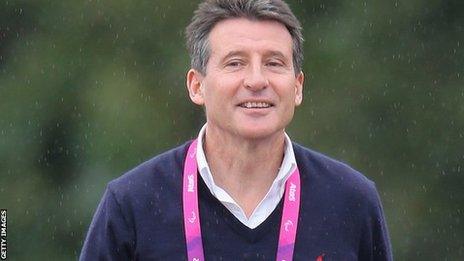London 2012: BOA bosses ignored budget warning
- Published

Olympic Stadium
The cash-strapped British Olympic Association has defended its spending in light of expectations that it will run up a record deficit of £2m this year.
It has emerged that the BOA was warned about its finances more than a year before the start of the 2012 Olympics in London.
Sir Craig Reedie, a former BOA chairman, distributed a briefing paper at a meeting of leaders from all the Olympic sports in early 2011 that urged Team GB bosses to live within their means.
The BOA's accounts for 2011 have already revealed a £421,084 loss, while only last month the organisation asked for a six-month extension of its overdraft from £4m to £5m. As for the 2012 figures, those will not be known for sure until September 2013.
When questioned by BBC Sport about its finances, the BOA denied it had been reckless.
"The London Olympics were a once-in-a-lifetime opportunity for British sport," a BOA spokesperson said.
"It was therefore entirely appropriate to field a full team with the aim of winning more medals from more sports and inspiring as many people as possible to get involved in sport.
Great Britain's golden Games
"With this decision came a considerable financial commitment for the British Olympic Association.
"Without this investment, Team GB might not have finished third in the medal table, might not have won an amazing 65 medals, nor would 26 sports and 541 athletes have had the opportunity to inspire a generation.
"We would have failed in our responsibility if we had let this opportunity pass us by."
Repairing the BOA's battered bank balance will be the most pressing item for Lord Coe after he took over as chairman on Wednesday.
The two-time Olympic champion and chairman of the organising committee for the London Games (Locog) was the only candidate to replace Lord Moynihan, who announced in August he was quitting.
Moynihan, who succeeded Reedie in 2005, can point to the successes Team GB achieved at the 2008 and 2012 Games as justification for the BOA's spending.
BBC Sport's 20 most memorable moments from London 2012
The organisation lost £3m in 2007 and 2008 but returned to profit in 2009 and 2010 - thanks to the sale of its headquarters and four Games' worth of future ticket rights. The organisation now rents premises in central London.
The document handed out by Reedie at the National Olympic Committee meeting last year was a defence of the Joint Marketing Programme Agreement (JMPA) that he and chief executive Simon Clegg signed with Locog in 2005.
In that deal, the BOA ceded the domestic rights to the Olympic brand to Locog so it could raise money to pay for the Games, although JMPA deals are a condition placed on all bidding cities by the International Olympic Committee (IOC).
Initially worth £27m over seven years, the JMPA was the subject of constant sniping from Clegg and Reedie's BOA successors, who were convinced it was a bad deal.
Actual funding of Team GB between the Games is the responsibility of UK Sport, the agency that allocates lottery and public money to the various sports. In the four years prior to London 2012, UK Sport distributed £100m annually and a similar sum has been promised for the build-up to Rio 2016.
The BOA, on the other hand, is an independent body that must raise money to kit out Team GB, travel to and from Games, establish holding camps, and provide medical support and other services in the Olympic Village.
The reaction from athletes to the BOA's more professional approach in recent years in regards to Games-time support has been positive, but there has been a muted welcome for the attempts to broaden its influence elsewhere.
The 2006 appointment of Sir Clive Woodward to a handsomely paid "elite performance" role similar to those already done by UK Sport staff was one such move, but last month he became the first high-profile casualty of the need to cut costs.
But it was the attempt to rip up the JMPA and extract more money from Locog shortly after the 2011 NOC meeting that caused the most controversy. The IOC watched this civil war with horror until enough pressure was exerted on Moynihan to accept an additional £3m.
Locog also granted the BOA permission to market two items of Games-related merchandise. They opted for collectable medals and a "supporters' scarf". Sales of both were disappointing.
It had been hoped the BOA's worries would be eased by a £5m bonus that Clegg and Reedie secured in the original JMPA talks.
But that sum must be "top sliced" from London 2012 profits that are now considered unlikely to materialise.
- Published7 November 2012

- Published10 September 2012
